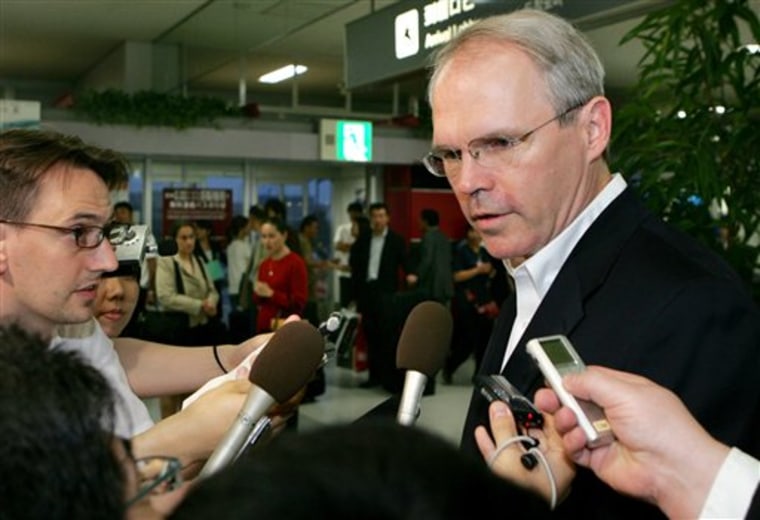The United States on Sunday pushed China to apply more pressure on North Korea to end its missile tests and return to international nuclear disarmament talks. A top diplomat said the aim is to show that Kim Jong Il's government has "no support in the world."
Undersecretary of State Nicholas Burns also indicated the United States would not grant North Korea the direct talks it is seeking in the wake of its test-firing of seven missiles, including some that possibly could reach the American continent. President Bush has opposed one-on-one negotiations, too.
"We really don't see the logic of turning this into a test of wills between two countries _ the United States and North Korea," Burns said.
The diplomatic goal is to compel North Korea to return to stalled six-nation talks aimed at ridding the reclusive communist-led nation of its nuclear weapons program, Burns said. The U.S. consistently has rejected formal direct talks with North Korea, preferring the six-party negotiations, deadlocked since November.
U.S. officials have previously said they would only have direct discussions with North Korea in the context of the six-party talks. U.S. and North Korean officials have had informal meetings on a number of occasions over the past few years.
"The problem here is not the lack of discussion between the United States and North Korea," Burns said Sunday. "We're perfectly willing to sit down with them in that six-party environment."
Getting support from China, North Korea's main ally and trading partner, is seen as crucial. Burns, joined by members of Congress, urged Beijing to use its "influence and exert some pressure on the North Korean regime" to return to the talks that involve the Koreas, the United States, China, Russia and Japan.
These efforts, he said, are aimed to "convince the North Koreans that they're isolated, that they have no support in the world, and they've got to come back to this six-party framework."
China recently proposed that the six-party talks resume on an "informal" basis in an effort to entice North Korea back to the table.
Christopher Hill, the top U.S. envoy to the nuclear negotiations, has been in Asia, talking to his diplomatic counterparts; Secretary of State Condoleezza Rice and President Bush have been calling world leaders in the region; at the United Nations, Japan has proposed a Security Council resolution calling for penalties against North Korea.
"As many of you know, the Chinese have talked about putting together a six-party informal, and we both support that and we think that all countries are prepared to come to that informal meeting," Hill told reporters in Seoul recently after meeting with South Korea's top nuclear negotiator.
Asked about the possibility of a bilateral meeting with the North, he said: "Within the informal six-party talks, yes, I can. I just can't do it when they are boycotting the six-party talks."
The U.S., Britain and France support the idea of penalties against North Korea over its missile testing, but the other two veto-empowered members of the council, China and Russia, are opposed. "We think we've got the votes to pass that," Burns said of the resolution.
Burns expressed confidence that a united message could be sent. China and Russia, he said, "understand that, as two members of the six-party framework, they have a responsibility to use their influence with North Korea."
Sen. John McCain, R-Ariz., said that how Beijing handled North Korea would be a "defining issue in our relations with China." He suggested that if China continues to "vacillate" in the United Nations, "there are consequences in our relationship."
"There are many key areas that we are cooperating in that I believe would be affected, including trade, by China's failure to act," McCain said.
Sen. Richard Lugar, chairman of the Senate Foreign Relations Committee, is now relenting from his earlier advocacy of direct negotiations.
"The shots eliminated the efficacy of that," said Lugar, R-Ind.
Burns appeared on CNN's "Late Edition," "Fox News Sunday," CBS' "Face the Nation" and NBC's "Meet the Press."
